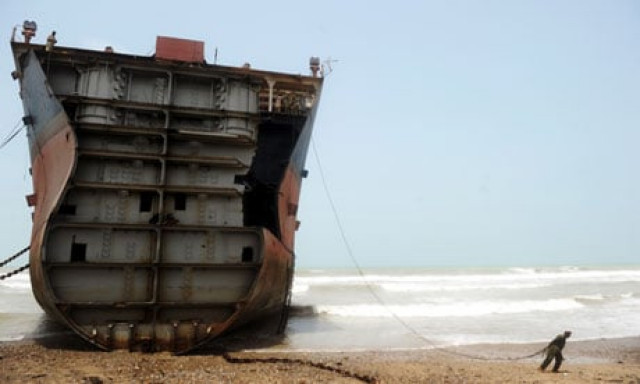Coast that blushed: 'pink' tide at Gadani
Bizarre natural phenomenon turns sea a startling colour, but real story lies beneath the surface

The sea at the Gadani jetty, a coastal area near Karachi, has mysteriously turned a startling shade of pink, accompanied by a foul smell that has spread across the harbour, causing significant alarm among local fishermen.
This unusual phenomenon has transformed a vast stretch of the coastline, prompting questions about whether it is a dire environmental warning or a natural, albeit unsettling, occurrence.
While the "pink tide" has worried the local populace, a leading expert suggests the cause is not an open-sea environmental disaster but rather the result of a long-standing engineering failure at the Gadani Fish Harbour itself.
According to Moazzam Khan, a Technical Advisor for WWF-Pakistan, the discoloration is confined to the jetty area, which has effectively become a stagnant pond.
"A harbour was built in Gadani for fishermen," Khan explained. "Due to some complications in its structure and construction, boats cannot enter the jetty. When it was completely closed, the water accumulated like a pond."
This stagnation, Khan said, is the root of the problem. "When sea water is kept at a certain place, that water starts to rot after a while because there is huge biological material inside this water, which causes a bad smell after decomposition," he stated.
The process is exacerbated by evaporation. As the trapped water heats up, it evaporates, leaving behind an increasingly high concentration of salt, he said.
This high-salinity environment is the perfect breeding ground for a specific type of salt-loving bacteria, known as halophiles. "It is a coincidence that this bacterium has its own colour, pink, due to which the water turns pink," Khan noted.
He compared the situation to commercial salt production, where seawater is held in shallow ponds. "When the process of salt formation takes place, the colour of these ponds... starts to turn pink at first, and then white salt starts to form."
Khan reassured the public that the phenomenon is not dangerous to humans. "This is not harmful," he said. "It is a natural process that there is absolutely no need to be afraid of. This bacterium cannot affect humans because it thrives in a lot of salt."
Man-made crisis
Despite the natural explanation for the colour, the situation highlights a colossal waste of public funds and a significant hardship for the very community the jetty was meant to serve.
"Gadani Jetty has been designed wrongly from day one," Khan asserted. The design flaws are so severe that fishermen still resort to mooring their boats along the coast, using "centuries-old outdated methods," which he described as a "great injustice."
Experts warn that if the jetty's structural issues are not addressed, the situation will worsen. The increasing salinity will accelerate sand and silt deposition, eventually filling the harbour completely. "This will be a great tragedy."
Calls for urgent action
While Khan is confident in his assessment, other environmental experts have stressed the need for urgent research, calling for water samples to be taken for laboratory analysis to rule out any other pollutants or underlying environmental problems.
Local fishermen remain deeply concerned, fearing that the stagnant, foul-smelling water could devastate fish reproduction and other marine life, putting their livelihoods at risk.
Environmental groups have appealed to authorities to immediately address the jetty's design, investigate the water quality, and ban the dumping of any unfiltered waste into the sea.
The consensus is clear: urgent steps must be taken to resolve this "extraordinary situation" before the Gadani jetty becomes another cautionary tale of failed infrastructure and environmental neglect on Pakistan's coast.





















COMMENTS
Comments are moderated and generally will be posted if they are on-topic and not abusive.
For more information, please see our Comments FAQ